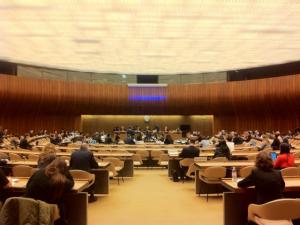In the second and concluding session of China’s UN review for its compliance with the Convention Against Torture, the Chinese delegation resorted to a familiar formula in responding to the detailed questions raised by the Committee against Torture experts: long lists of partial and out-of-context statistics, citing formal laws and regulations, generalized and vague descriptions of actual practices without benchmarks or indicators to gauge progress, and claiming a “developing country” status to justify incomplete information or inadequacy of measures to combat torture. In a new twist on the cultural difference argument, China attributed the lack of a comprehensive definition of torture in Chinese law to the difficulty in aligning the broader concept of torture under the Convention with the Chinese word for torture, “kuxing.”
At times, the assertions made by members of the Chinese delegation strained the bounds of credibility and reason. Some examples include:
Some of the answers from the Chinese delegation betrayed a significant deficit in understanding of international standards, e.g., the professional and independent role of lawyers and judges. In an answer to the question of what constitutes disruption of court order that could result in the revocation of a lawyer’s license, a Chinese delegate said that one lawyer asked the judge to follow his line of thinking in the judgment.
Over the course of the two sessions, the Committee also repeated its requests for key information and, at one point, an expert asked whether China did not provide the information because it could not (due to state secrets) or because it would not. The Committee also placed particular emphasis on pressing the Chinese government to address the lack of judicial independence and the lack of protection of lawyers’ rights to professional practice, with six out of nine Committee experts asking repeated questions on the subjects. Among the issues raised by the experts are the troubling absences of:
One expert stressed that if China could empower its legal profession and allow the possibility for citizens to bring actions against the state for violation of fundamental rights, particularly on complaints of torture, and if its courts could function as an effective arbiter between the rights of a citizen and the right of the state, then the efforts that China is making in the prevention of torture will “produce fantastic results.”
The Committee will publish its concluding observations on China’s report on December 9. The concluding observations will set forth the Committee’s concerns and recommendations for steps that China must take to adhere to its obligations under the Convention. In addition, the Committee will select some concerns and recommendations that are “serious, protective and can be achieved within one year” for China to follow up on prior to the next review. Civil society groups are invited to also provide information regarding China’s implementation of the follow-up recommendations within a year. The Committee will select a Rapporteur for follow-up to oversee this process and to respond to the information and efforts undertaken. In April 2016, China is also encouraged to provide the Human Rights Council with a mid-term update on the recommendations it accepted during its last Universal Periodic Review. These include, among others, recommendations related to torture such as:
